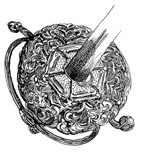
Episcopal Authority: Use It or Lose It
AMBIGUITY IS NO SERVICE TO GOD'S PEOPLE
Let me begin with a true story that happened in 1992. I had been named Bishop of Lincoln, and I had had as much expectation of becoming a bishop as I had of becoming a cannibal. It was not in my categories. Now, the parishioners in my former parish in suburban Milwaukee were eager to have me come back and offer Mass as a Bishop. They wanted to see what I looked like in that regalia. With the agreement of the local Archbishop, I returned in November of that year to say Mass at the parish and to do some other business.
The priest who was my Master of Ceremonies drove me there and back again, and while I was on my business this priest friend visited some college classmates of his in another Milwaukee suburb. As we were driving home, he said, “I can’t believe what I heard, Bishop.” I said, “What did you hear?” He said, “Well, the priest of the parish where my classmates attend Mass said to the people that the saddest day of his life was the day an attempt was made to assassinate the Pope. But it wasn’t because of the atttempt — it was because the assassin did not succeed.” I said, “I lived in Rome for 18 years and I’ll tell you an old Guelph proverb. It goes like this: Whoever eats the pope chokes to death. Mark my words.” Well, I wasn’t back home but a few hours when I received a phone call from a priest friend in Milwaukee who said, “Did you hear what happened to [the priest who regretted that the assassination attempt failed]?” I said, “No. What happened to him?” “He had a stroke. He can’t talk.” To this day, that priest is completely paralyzed and in a nursing home and lives the life of a vegetable. I’m not superstitious and I don’t believe God necessarily intervenes so immediately or so directly, but believe me, my priest Master of Ceremonies thinks that He does.
There’s something very special about the apostle Peter and his legitimate successors in the See of Rome. Being the supreme Bishop of the Catholic Church, the direct successor of St. Peter, and the Vicar of Christ on earth carries with it a particular aura. Certainly in the almost 2,000 years of Catholic Church history there have been sinful and unworthy occupants of the See of Peter, but at the same time the overwhelming majority of popes have been men of sterling character, and many have been saints and martyrs.
Furthermore, those who are alleged in history to have led lives of personal immorality did not thereby in any way pollute the most pure Word of God or mutilate it or allow it to be distorted or changed. Truly the gates of hell have not prevailed. One must point out as well that many of the so-called sins of popes have saturated anti-Catholic polemics and are the stuff of distortion and exaggeration.
You May Also Enjoy
As for apologies to homosexuals, the saga of San Diego Bishop Robert Brom could be instructive.
Not celebrating this feast has the effect of diminishing Easter by restricting the reception of the very gifts Christ offers us.
Champions of the global economy accepted a trade-off: a richer world but with a good many poorer Americans.

